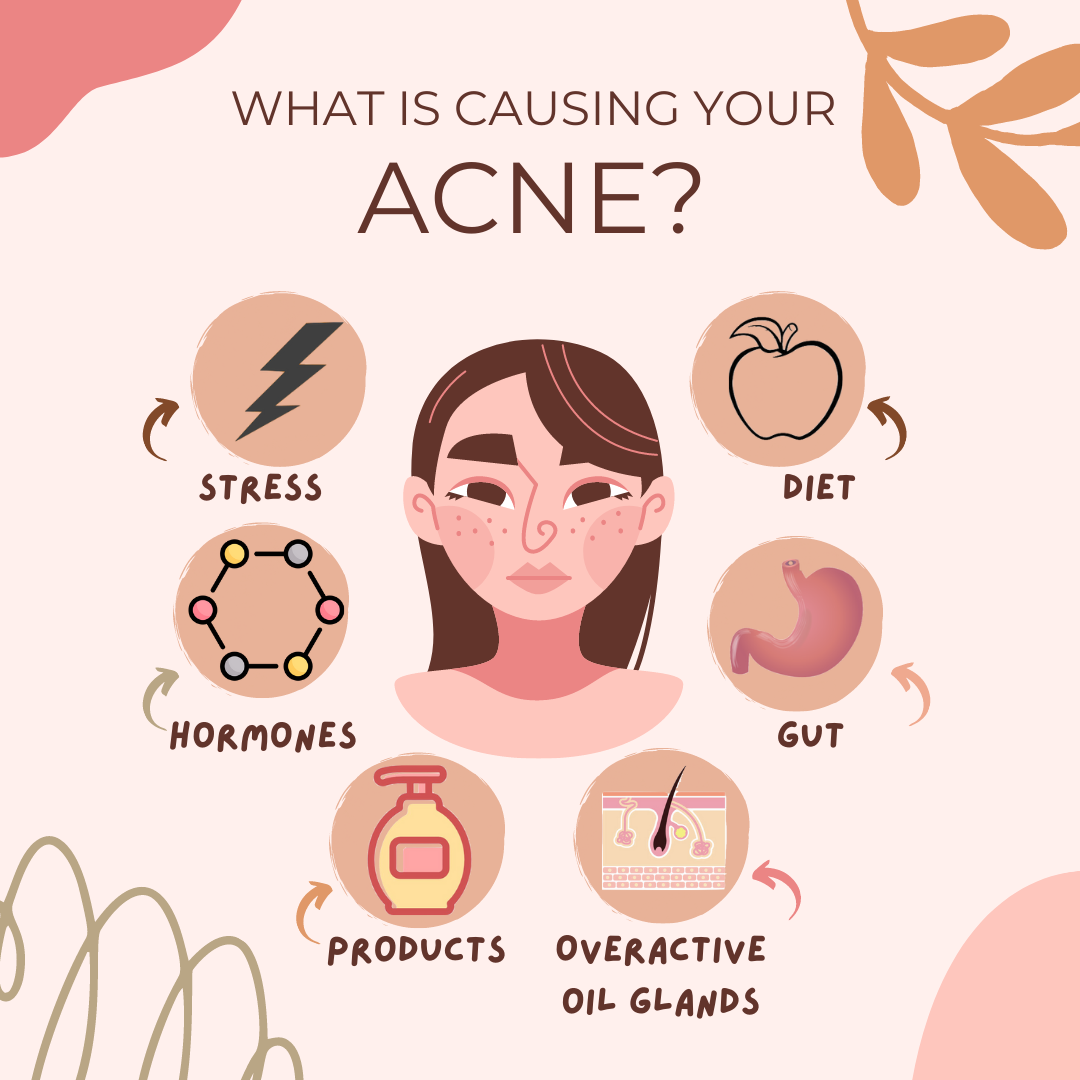Have you Googled every acne remedy possible but can’t seem to find the cure? Acne is not as simple as it seems and many factors in your daily life might be contributing to it.
So, what is causing your acne?
Acne is very complex, it can be triggered by many things and can affect you at any stage of your life. Some of the reasons why you are getting breakouts may be caused by stress, diet, hormone fluctuations, gut bacteria dysbiosis, or products you may be using on your skin.
Stress
Stress can be caused by several factors, including emotional stress and physical stress like poor sleep, overexercising, and skipping meals. Stress triggers the release of cortisol from our adrenal glands and increases the levels of corticotropin-releasing hormone. This hormone tells your sebaceous glands of your skin to produce more oil. When oil production increases, it creates an ideal environment for bacteria, clogged pores and acne. This also contributes to inflammation and can slow down the healing process after a breakout.
For dietary, supplement, and lifestyle strategies to help lower cortisol, check out my blog post here: Cortisol and Women’s Hormone Balance
Stress is a major contributor to acne, however it is also important to prioritize diet. Eating a healthy balanced diet can help promote clear skin and prevent acne.
Dietary strategies to reduce acne
Balancing blood sugar and insulin levels is crucial for preventing acne. High insulin levels produce a hormone called insulin growth factor (IGF-1), which directly leads to an increase of androgens. Androgenic hormones are a class of hormones that include testosterone, androstenedione, DHEA, among others. When elevated, these androgenic hormones increase production of oil, leading to breakouts. Excessive amounts of fats and oils in the diet also increases sebum and lipid secretion in skin. Dairy may also be a contributor to inflammation. There is strong evidence that dairy consumption significantly increases serum IGF-1 levels, which produces pro-inflammatory cells.
The best dietary approach is built on a diet abundant in plants with quality protein and good sources of carbohydrates coming from fruits, vegetables, and starches to balance blood sugar.
It’s important to note that what you drink can also impact your skin. Alcohol and caffeine are chemicals that can be toxic at high levels. Frequent consumption puts more strain on our liver. The liver is the predominant place where toxins and hormones are metabolized and converted. When the liver doesn’t have the micronutrients available to detoxify, the process can get backed up and this can trigger acne. There are many nutrients involved in the detoxification of the liver, below is a graphic that highlights these.

Zinc and selenium are two minerals that can also be beneficial for the skin. Zinc is found in sea products like seaweed, seafood and seeds. It plays a critical role in tissue, skin, and the ability to create hormones. Selenium is an important mineral to support healthy skin because it helps protect the skin from ultraviolet rays. You can meet your daily requirement of selenium by eating 2-3 Brazil nuts a day.
Nutrition Recommendations:
– Look for organic and pasture raised products to limit the herbicides and hormones used in the production process.
– Avoid using refined oils like canola and soybean oils.
– Eat at least 2 cups of raw cruciferous vegetables a day to help with hormone detoxification.
– Be careful with excessive fat intake from oils, nuts, seeds and animal products.
– Include balanced portions of protein, vegetables, starches fats, and fruits at each meal and snack.
– limit eating naked carbs (carbohydrate-rich foods that are consumed alone, make sure that snacks and meals are balanced).
– Trial no dairy for a few weeks to see how your skin responds.
– Incorporate anti inflammatory fats like salmon, egg yolks, chia seeds, and flax seeds.
– Increase micronutrients like zinc and selenium.
Stress and diet play critical roles in reducing oil production and supporting liver detoxification. However, what you put on your skin is equally as important.
Skin products
According to Carolyn Alsalehi, a Licensed Aesthetician and Certified Acne Specialist, the most common pore clogging ingredients she notices that clients use are coconut oil and shea butter. We may think they are good because they are natural but they may be one of the causes contributing to acne. Furthermore, it’s also important to frequently wash brushes and beauty tools to prevent additional bacteria formation which can lead to more breakouts.
Some of the best ingredients recommended for all types of acne are:
– Mandelic acid: a gentle chemical exfoliant derived from bitter almonds
– Lactic acid: helps remove dead skin cells
– Moisturizer: creates a barrier that protects and soothes skin
– SPF: protects the skin barrier and prevent scarring

Learn More
Click here to watch a free masterclass with Carolyn: A Holistic Approach to Healing Your Acne Through Diet + Skincare
For my favorite products to use to clear a breakout when it happens, check out my Clear A Breakout Vitamin Protocol here.
If you are ready to get to the root cause of your skin troubles, apply to work together!
Find me on IG at @NutritionWithLo
Written by: Mariana Lozano
Instagram: @marianalozano00
Comments +